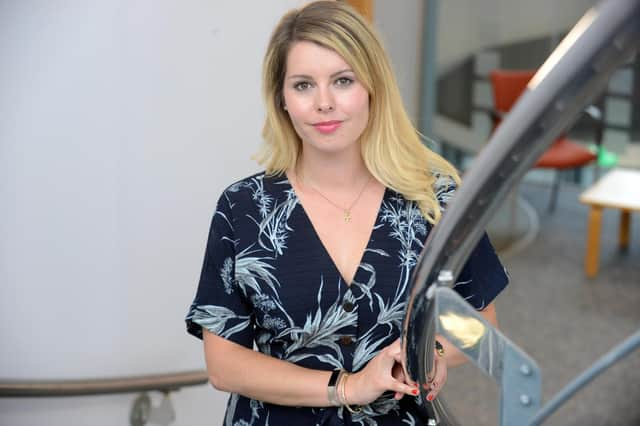KIM McGUINNESS: ‘Are you part of the problem?’ as a new campaign to prevent sexual harassment gains traction across the region


They have been brought to life via a series of powerful videos as part of a new campaign I launched last month along with Rape Crisis Tyneside and Northumberland to drive culture change and prevent sexual harassment here in the North East and beyond.
#ItAllAddsUp is the name of our campaign and it’s gaining traction online everywhere from Twitter to Tik Tok.
Advertisement
Hide AdAdvertisement
Hide AdThese videos are relatable. I keep getting told so with people reaching out to me online saying so. They feature women of different cultures, ages and sizes to highlight how sexual harassment happens to all women, not just the stereotypical beauty being chatted up in a nightclub. They’re experiencing harassment in different settings too, such as on the bus in a rural community, with a child in a park or when popping to the shops in broad daylight.
A woman in one of the focus groups said, “my mam experienced harassment coming out of the shop – a bunch of teenage lads saying look at the size of that woman’s knockers”. Another told how when she feels uncomfortable in a public place, she texts a friend saying, “If I don’t text you in 30 mins, call the police”, demonstrating the real fear that is felt. It was also apparent that sometimes when people do step in, they don’t call the behaviour out but blame the victim saying things like “mate she is clearly on her period leave her be, she isn’t worth it.”
Which leads me to ask would you know what to do if you saw sexual harassment? Are you part of the problem?
As part of the campaign, we are wanting to share advice on how we can all be better allies if we witness sexual harassment in public places.
Advertisement
Hide AdAdvertisement
Hide AdEarlier this year, I commissioned experts to roll out ‘active bystander training’ throughout the force area, as part of a £1million pounds project investing practical solutions and behaviour change projects to keep people safe in our region. This training is designed to give people the confidence to have conversations with friends and colleagues and equip them with the tools they need to respond safely, support a victim and call out potentially harmful behaviours. So far, 82 people who work with men and boys across the region have completed the ‘active bystander training’ and 32 have gone on to complete training which will enable them to train others. It is expected that 3000 men and boys and people in our communities will become fully trained active bystanders before the end of 2023.
There can be no more turning a blind eye to sexual harassment. We know 71 per cent of women have experienced harassment in public places. My office’s survey also told me women wanted to see more being done to drive the change in attitudes and behaviours towards women and girls – this is exactly what all this work is doing.
Not doing anything gives some men and boys the OK to go further and this can lead to horrific consequences for the victim. So, with the powerful #ItAllAddsUp campaign we are doing the very opposite of turning a blind eye; we’re shining the spotlight on it and calling it out. And with that it’s important people know what to do in the situations shown in the campaign. It’s not to say you should ever put yourself in a dangerous situation but there are times and ways in which we can all help stamp out the unwelcome comments and behaviours that often, as women, we just put up with as they have become part of everyday.
Research tells us that by training people to be better bystanders we could end up with fewer sexual violence incidents. This work won’t put an end to VAWG overnight but it’s crucial for culture change and long-term prevention and I urge everyone to search #ItAllAddsUp online and ask themselves if they are part of the problem.
Together we can take important steps to empower others in the fight against violence against women and girls in our region and beyond.